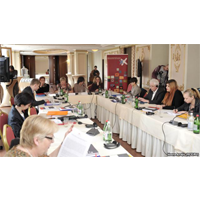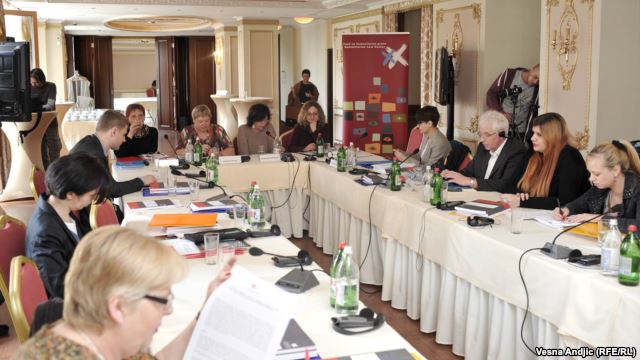History textbooks in post-conflict societies: Education for reconciliation?
On Friday April 24th, 2015, the Humanitarian Law Center (HLC) held a conference History textbooks in post-conflict societies: Education for reconciliation? The HLC’s aim was to contribute to the debate on the role of education in the process of dealing with the past and overcoming its heavy legacy, and the actualization of the issue to do with the contents of history textbooks regarding the wars and war crimes committed on the territory of the former Yugoslavia during the 1990’s. Experts in the fields of history, political studies, law, sociology, and philosophy, many of whom have already made their contributions to the analysis of the content of history textbooks, were invited. The participants were invited to offer their answers to the problem of how historiography today values the judicial facts about war crimes, why most of the textbooks ignore these facts, which historical sources are relevant for the wars waged during 1990’s, and what the role of the voluminous material now available about war crimes, collected by the International Criminal Tribunal for the Former Yugoslavia (ICTY), might be in the creation of a common historical memory of all societies in the former Yugoslavia.
When opening the Conference, the HLC Executive Director, Sandra Orlović, pointed out one may clearly note, when reading the history textbooks in Serbia, that they depart from the facts established in court proceedings held before the ICTY .
The Ambassador of Switzerland to Serbia, H.E. Jean Daniel Ruch, emphasized that learning based on ideology creates narratives which maintain or reproduce a stereotypical image of the others, and that the ethnically biased education programmes which are being utilized in the region today, represent one of the obstacles for reconciliation in the region.
A Professor at the University of Teacher Education in Lucerne, Peter Gautschi, presented the process, effects and reactions to the reform of history textbooks in Switzerland; whereas Professor Augusta Dimou from Humboldt University in Berlin, told the participants about the role of history textbooks in the process of modernization in the Balkans and Europe, and the challenges met in the creation of the textbooks.
Dubravka Stojanović from the University of Belgrade, Snježana Koren from the University of Zagreb, and Vera Katz from the Institute for History in Sarajevo spoke about the history education programmes in Serbia, Croatia, and BiH. According to Professor Stojanović, history textbooks in Serbia explain the wars in the former Yugoslavia as the cravings of Slovenia and Croatia for separatism, and when they write about war crimes, they only emphasize the crimes committed against Serbs. Ms. Stojanović underlined that Serbia is using and abusing its own history, as a result of which history classes do not have an educational function, but the task of shaping national identity. In Croatia, as Snježana Koren explained in her presentation, learning about the war is placed in the context of ‘a patriotic upbringing’, and the presentation of the war is being ideologized and not being understood as a tragedy. Professor Koren also presented the debate and the reactions in Croatia following the publication of a manual in the production of which she participated and which presented the war in Croatia from a number of different angles. Vera Katz, from the Institute for History in Sarajevo, spoke about history textbooks in BiH, and particularly stressed the problem of complexity, because of the existence of three different education programmes, whereby schoolchildren learn about the Serbian, Croatian and Bosnian versions of history. There are certain common features in these histories, including the biased presentation of their own ethnic groups, the omission of „unwanted“ information, the concealment of facts, and self-victimization. According to Dubravka Stojanović, a comparative analysis of the textbooks in the countries of the region has shown that they still contain all the arguments which had been used for inciting the wars, thus creating irreconcilable positions in the societies in the region, which keep the conflict open.
A Professor at the University of Belgrade, Nikola Samardžić, assessed that the history textbooks have not been designed in a manner which provides knowledge about the events of the 1990’s. The lectures are boring, dull, burdened with statehood, abbreviations and numbers; the textbooks do not offer instruction on the basis of which one could understand the past or draw conclusions from it. However, he emphasized that the interpretation of the events of the 1990’s is better today than was the case in the textbooks used 10 years ago; which, according to him, gives hope that pressures coming from the civil society and experts can produce positive long-term results reflected in positive changes.
A Lawyer and an expert in International Law, Ivan Jovanović, pointed to the reasons for using judicial facts as a relevant historiographical source. As Mr. Jovanović stressed, court proceedings come from a number of sources that a researcher might not be able to access, and the proceedings themselves, which involve a number of witnesses, experts and extensive documents, conduce to the reliability of the judicial facts. In addition to this, judicial facts are prone to revision only in extraordinary cases, while the legal qualifications of such facts may be of great importance for historians when defining a certain event in the presence of a number of conflicting opinions.
At the end of the Conference, Stana Tadić and Marijana Toma from the HLC presented the Analysis of the content of history textbooks in Serbia relating to the wars in the former Yugoslavia. The Analysis has shown that the textbooks present the wartime events in a selective and ethnically biased manner, hardly speak about war crimes, offer no details, and do not present the sufferings of Croats, Bosniaks and Albanians – however, more details are offered when presenting the crimes committed against Serbs. Most attention in the textbooks is given to the war in Kosovo, which is usually discussed in the context of the bombing of FR Yugoslavia and the perishing of Serbs during the bombing and following the withdrawal of the Serbian Army and police from Kosovo; while the crimes committed against Albanians are not mentioned at all. Despite the fact that the war in BiH was the longest in duration and the most destructive, and that the greatest number of Serbian people were killed in this conflict, it is the least spoken about in the history textbooks.
***
The History textbooks in post-conflict societies: Education for reconciliation? Conference was organized as part of the HLC’s Education for Reconciliation Programme. It is a regional and national programme of informal education on the process of dealing with the past, targeting students of undergraduate and graduate studies, young professionals engaged in the Judiciary and state institutions, and the activists of the civilian society.







